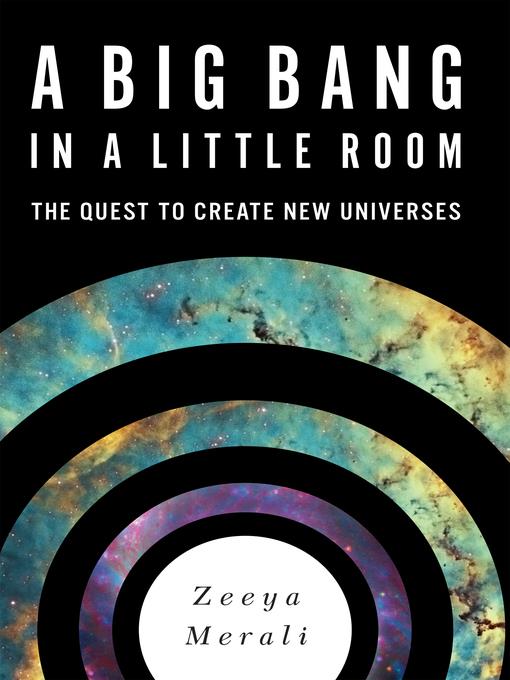
A Big Bang in a Little Room
The Quest to Create New Universes
- اطلاعات
- نقد و بررسی
- دیدگاه کاربران
نقد و بررسی

Starred review from March 6, 2017
In this intensely theoretical yet accessibly humanist work, science journalist Merali skillfully appraises the fascinating possibility of creating a universe in a lab. Her interviews with physicists suggest that such a thing might actually be possible, though not with current technology. Merali explains many theories about how universes might occur or be created inside our own, including false vacuums, elusive monopoles, and black holes. Amid clear explanations of mind-blowing physics concepts, Merali takes the time to humanize everyone she interviews. In particular, her discussions of religion and how scientists have managed their faith and their work are refreshingly matter-of-fact. Merali supplements the technical aspects of making a universe with the implications for how we view ourselves and our world, providing welcome context to the theories and questions she explores. Does time exist without an observer inside our universe? Is a multiverse compatible with free will? What are the ethics of potentially creating sentient life? Merali attempts to answer these and many other questions, revealing a sense of wonder and curiosity that make the book as deep and heartfelt as it is meticulous and scientific. Agent: Eileen Cope, Mark Creative Management.

December 1, 2016
It's a mind-boggling concept fraught with implications about our own universe's origin, but scientists argue that it may someday be possible to create a new universe not so unlike our own in a lab.In her elegant and perceptive book, Merali (Visualizing Earth Science, 2009, etc.) unpacks the science behind what we know about our universe's beginnings and traces the paths that many renowned researchers have taken to translate these insights to new heights: the creation of a brand-new "baby" universe, and not an empty one, either, but one with its own physics, matter, and (possibly) life. While at times the book's central conceit seems adjunct to the narrative in each chapter, the author's storytelling makes up for it. Among the most significant scientific advances in the last half-century is the discovery that our universe is inflating exponentially, a theory that led to many more breakthroughs in physics and cosmology. Yet the big question--how did the universe form, triggering inflation to begin with?--remains opaque. Merali, who works at the Foundational Questions Institute, which explores the boundaries of physics and cosmology, effortlessly explains the complex theories that form the bedrock of this concept, and she brings to life the investigators who have dedicated much of their careers in pursuit of fundamental truths. She also neatly incorporates discussions of philosophy and religion--after all, nothing less than grand design itself is at stake here--without any heavy-handedness or agenda. Over the course of several years, she traveled the world to interview firsthand the most important figures behind the idea of laboratory universe creation--e.g., Alexander Vilenkin, who has theorized about "a multiverse of parallel universes, containing an infinite number of clones of each of us"--and the anecdotes she includes surrounding these conversations make her portrait even more compelling. A rich and wonderful cosmological history that illuminates the scientific possibility of the nearly unthinkable.
COPYRIGHT(2016) Kirkus Reviews, ALL RIGHTS RESERVED.

February 1, 2017
Merali, a journalist who has contributed to publications such as Scientific American and Nature, interviews physicists researching the origins of the universe, beginning with the search for a telltale "fingerprint" from the creation of this universe and leading on to the possible human-made invention of a new miniuniverse in the lab. In the process, these discussions blur the boundaries among concepts of physics, philosophy, and even religion. Complex ideas are well explained in lay terms. Merali tethers the theoretical to the earthbound by including the scientists' biographical and philosophical background and by setting the interviews in the context of her own journey. The spirituality of a few of these scientists may be eye-opening to readers. VERDICT Although the subject material might be too heavy for some, this is fascinating reading material for those who can follow the science.--Teresa R. Faust, Coll. of Central Florida
Copyright 2017 Library Journal, LLC Used with permission.

Starred review from December 15, 2016
In the big bang that started our universe 13 billion years ago, Merali sees the cosmic prototype for history's most audacious yet perhaps not-so-far-off scientific experiment: the deliberate triggering of a universe-creating eruption in a human laboratory. To explain how physicists might conduct such an experiment, Merali explores cutting-edge science, venturing deep into cosmology, quantum mechanics, and relativity. Having personally interviewed many of the pioneers doing this science, Merali gives readers not only up-close looks at revolutionary science in the making but also memorable glimpses of the colorful revolutionaries. But for most readers, the piquant personalities will matter far less than the astonishing possibility now emerging from these pathbreakers' collective laborsthat of converting a false-vacuum bubble of space-time weighing just 25 grams into a new infant universe! While specialists surmount the remaining technical obstacles, readers may want to join the author and theorists in their probing reflections on just what it meansnot only scientifically, but also morally, and even theologicallyto create a cosmos. What ethical responsibilities would the creators of a new universe take on? What might the intentional creation of a new universe teach us about the inception and evolution of our own universe? Science has never offered broader intellectual horizons!(Reprinted with permission of Booklist, copyright 2016, American Library Association.)




دیدگاه کاربران